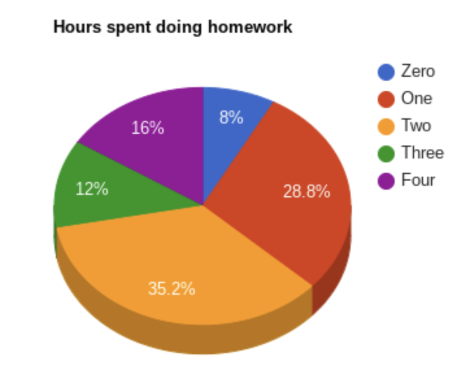A source of stress: why homework needs to go away
December 17, 2021
When Owen Davis goes home after a long day of school at Loy Norrix and KAMSC, all he wants to do is relax and spend time with friends and family, but he realizes he has loads of homework to complete for the next day. Davis is in difficult classes, including Geology, AP Statistics, and Advanced Computer Science, which all give him a lot of homework.
Homework is a burden for students, as they usually have substantial amounts of homework every day after school where they do not have a sufficient amount of time to complete it due to other priorities they have, such as extracurriculars and family obligations. Homework is supposed to be beneficial for students, yet it is the complete opposite as all it does is increase student’s levels of stress dramatically and makes their life harder.
According to When Homework Causes Stress, “In 2013, research conducted by Stanford University demonstrated that students from high-achieving communities experience stress, physical health problems, an imbalance in their lives, and alienation from society as a result of spending too much time on homework. According to the survey data, 56 percent of the students considered homework a primary source of stress. The remaining students viewed tests and the pressure to get good grades as the primary stressors. Notably, less than 1 percent of the students said homework was not a stressor.”
Many students at Loy Norrix feel tremendous stress due to the large amount of homework they get every night as they would like to relax after a long day at school, yet they need to continue their diligent studies at home.
From a survey of 124 students, about 100 agreed that homework is unnecessary and students feel overwhelmed from it due to their extracurriculars outside of school.

A majority of students claim to spend 2+ hours on doing homework every night.
One third of students surveyed are in AP classes or are in KAMSC and claim these types of classes assign them a lot of homework, causing them stress.
Students in regular classes claim to have less homework than those in honors and AP classes, yet these students in regular classes still believe their homework is unnecessary.
Senior Ari’el Abbott who is taking AP classes at Loy Norrix mentioned her disapproval of homework’s effects on her mental strength.
“Sometimes homework goes to the point where you are doing so much it’s harder to retain what you are learning compared to what is needed to know,” Abbott said. “I can be working for 4 hours in a class, and by the time I finish with the one class, I am too tired to even attempt to do another class which could cause one of two things: me working hard overdoing myself and possibly getting a bad grade on the assignments or mentally exhausting myself and then becoming behind in multiple classes. Either way the assignments are taking too long to complete which causes me to overwork myself.”
According to Kalamazoo Public Schools sets districtwide homework policy, the KPS District suggests that teachers give 10 minutes of homework per night for students in kindergarten and first grade and increase the amount by 10 minutes per night as grade levels go up. This means that seniors in high school are recommended to have roughly two hours of homework per night.
Students in high school get way too much homework every night as they also have extracurricular activities and other duties to do, and the last thing they want to do after a hard day of school is to continue learning what they have already covered in school.
Many students feel the amount of homework they receive influences their lives in a way where they cannot do the things they love. Senior Matthew Gray said how homework has affected his life during virtual learning.
“Online, I’d be getting huge projects and essays to do, so I would just be on my computer all day and miss out on other things I could be doing, such as hanging out with friends and family, since I have things to get done,” Gray said.
Another person that doesn’t see the positives of homework is AP Spanish teacher Christina Holmes.
“I try to keep homework to a minimum,” Holmes said. “I feel like homework should only continue something that has been worked on in class. I would never assign new material as homework. Homework, if given, is one of two things, an opportunity to complete an assignment that was worked on in class or an opportunity to use the language in a real life setting, such as watching a TV show in Spanish or talking to someone in Spanish,” Holmes said.
While some students and teachers do not admire and agree with homework, other students and teachers do see the necessity of homework. AP Calculus teacher Adam Hosler is a proponent in favor of homework.
“Homework is especially important for math as you have to practice the skills on your own to internalize it, to know what you’re doing,” Hosler said, “I think the amount of homework students should do is dependent on the student’s level, so AP kids would have more homework than kids in Algebra II, so I think there’s a feel on how much homework students should do. I base homework on quality over quantity: as long as you understand the topics, instead of how much homework you do. Students do need more practice based on their levels on certain topics though.”
According to Is Homework Beneficial? – Top 3 Pros and Cons, students who do homework for 30 to 90 minutes a day score 40 points higher on the SAT Math portion than students who do no homework a day.
Additionally, in relation to standardized tests and grades, students who do homework perform better than 69% of students who do not have homework.
Statistical research from the High School Journal on the impact of homework showed that 64% of students in one study and 72% of students in another study, improved academic achievement due to having homework.
Homework’s so-called purpose is to be beneficial to students, yet it appears to be the direct opposite, as homework usually causes negative effects for students.
If teachers are to give students homework, it should be homework that is relevant to the real world. It should contain skills that are realistic to the skills you would use in real life. Homework should not be worksheets that are irrelevant to the world outside of their classes.
Teachers should be more mindful of students’ lives outside of school as teachers often load students with immense amounts of homework that students are not capable of completing, which makes their lives even more difficult on top of other obligations outside of school.
A change needs to be made on the homework policy. Homework should be relevant to the real world and not just monotonous daily worksheets that don’t seem to serve a purpose to the real world.
Less amounts of homework need to be given to allow students to relax outside of school and enjoy their lives, instead of constantly being stressed due to their homework duties.











